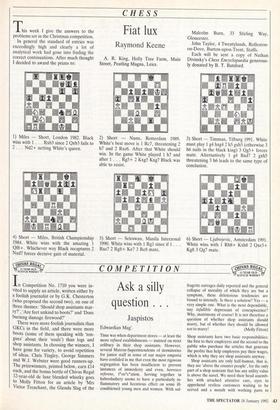1 3VAS REG AL 12 YEAR OLD
COMPETITION
V1VAS RECV 2 YEAR OLD SCOTCH WHISKY
Ask a silly question . . .
Jaspistos
SCOTCH WHISKY In Competition No. 1710 you were in- vited to supply an article, written either by a foolish journalist or by G.K. Chesterton (who proposed the second two), on one of three themes: 'Should shop assistants mar- ry?', 'Are feet unkind to boots?' and 'Does burning damage firewood?'
There were more foolish journalists than GKCs in the field, and there were more boots (some of them speaking with 'ton- gues' about their 'souls') than logs and shop assistants. In choosing the winners, I have gone for variety, to avoid repetition of ideas. Chris Tingley, George Simmers and W.J. Webster were good runners-up. The prizewinners, printed below, earn £14 each, and the bonus bottle of Chivas Regal 12-year-old de luxe blended whistky goes to Molly Fitton for an article by 'Mrs Victor Trenchant, the Glenda Slag of the Edwardian Mag'.
Time was when department stores — at least the more refined establishments — insisted on strict celibacy in their shop assistants. However, several Matron-Superintendents of dormitories for junior staff in some of our major emporia have confided in me that even the most rigorous segregation has been insufficient to prevent instances of immodesty and even, horresco referens, rrnseation. Serving together in haberdashery seems to have a particularly in- flammatory and licentious effect on some ill- conditioned young men and women. With suf- fragette outrages daily reported and the general collapse of morality of which they are but a symptom, these deleterious tendencies are bound to intensify. Is there a solution? Yes — a very simple one. What is the most dependable, nay infallible depressant of concupiscence? Why, matrimony of course! It is not therefore a question of whether shop assistants should marry, but of whether they should be allowed not to marry! (Molly Fitton)
Shop assistants have two basic responsibilities: the first to their employers and the second to the public who purchase the articles that generate the profits' that help employers pay their wages, which is why they are shop assistants anyway.
Shop assistants are only half-human, that is, they are 'above the counter people', for the only part of a shop assistant that has any utility value is above the navel. We need their head assemb- lies with attached attentive ears, eyes to apprehend restless customers waiting to be served and a mouth with working parts to articulate prices, discounts, stock-positions, spe- cial offers and assurances of quality. Also hands. Shop assistants' hands are important for ringing up cash, wrapping the goods and pointing where articles are displayed.
Since marriage invariably involves the redun- dant portion of their bodies, which ideally is ectoplasmic in the more evolved sort of shop assistant, it seems an inadvisable enterprise.
(Connie Yapp) We do right to speak of boots. One boot is as useless as a clockwork toy without a key, or a universe without a God. The day may come, indeed, when all boots are one Boot; but in that day we shall have a one-legged God.
The splendour of such a concept must not dazzle us. A monopod, equally with a millipede, can feel pain. Pain is the nobility of God; may it not also be the humbler nobility of boots?
We read that God first created the seas, then put fish in them. May he not equally have created boots, then put feet in them? The rest would surely follow: shins, legs, men. The Middle Ages spoke of the Chain of Being, ascending from stones to angels; why not one ascending from boots to the Football League? In each case, pain would pass from the lower to the higher. (Paul Griffin)
Well, yes, they are — and I can tell you one gets frightfully cut up about it. Feet are such nasty, clumsy, sweaty, knobbly things and the agony they cause boots must be horrendous. Especially if the boots are leather — doesn't matter so much if they're some ghastly man-made stuff because leather's a natural, breathing, living, organic material. But, hang it all, one has to wear the dashed things, whether on the grouse moor or the ski slopes, or playing polo or whatever. So what can one do about it? Well, one can talk to one's boots — ideally, as often as possible, but always when one puts them on and always when one takes them off. Now I know this'll make me look a right charlie, because when I said one should talk to one's plants, the press tried to make out I was some sort of a nut.
(Jonathan Fernside)
No! Burning does not damage firewood — it reorders, reconstructs, reinvents it. The very use of such a pejorative term as 'damage' betrays the writer's espousal of the ugliest of all the chauvin- isms, i.e. Matterism — the contention that some manifestations of matter are somehow intrinsi- cally superior to others: that passive firewood, for instance, is preferable to the ash to which fire reduces it, but which, as active fertiliser, can stimulate all manner of wholesome fresh growth. 'Dirt is simply matter in the wrong place,' we are arrogantly assured. In the wrong place? And who, pray, is the writer thus smugly to determine the right place? The grime on the rail-coach window, the slug in the lettuce, the grit in the carburettor, the suppurating sore on the finger of the pastry-cook — all these glorious
manifestations of matter have just as much right to be where they are as . . . (Martin Fagg) Not long ago I found myself in the USSR. There is little novel in this, except that overnight, without recourse to imagination or locomotion, I woke in the new republic of Russia. Curious as to the effects of such monumental change, I took to the streets.
All was as before. The queues of stolid faces coiled their way towards barren shelves; there was talk of a truckload of meat arriving else- where in Moscow. My companion, a journalist, who therefore saw life through squinted eyes, asked me: 'Why?'
He might as well have asked, 'Do they need to eat?' or 'Why do they not turn somersaults?' There could be no more flagrant example of a people fulfilling their primary purpose. When a bullet rips into a soldier's flesh or firewood bursts into heat and ashes, both achieve their zenith and their destiny; not damaged, but made



















































 Previous page
Previous page